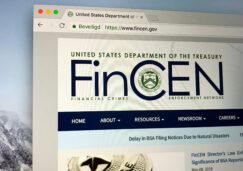FinCEN BOI 7/8/24 FAQs
El 7/8/24, FinCEN actualizó su página de preguntas frecuentes de BOI para incluir tres nuevas preguntas y una nueva actualización. FinCEN afirma que continuará brindando orientación sobre cómo presentar información sobre beneficiarios reales; incluida la actualización de las preguntas frecuentes
- Foodman Website and JD Supra
FinCEN BOI FAQs 7/8/24
On 7/8/24, FinCEN updated its BOI FAQs page to include three new questions and one new update. FinCEN states that it will continue to provide guidance on how to submit beneficial ownership information; including updating the FinCEN BOI FAQs 7/8/24.
- Foodman Website and JD Supra
FinCEN AML/CFT Regla Propuesta
El 6/29/24, FinCEN, en consulta con la Junta de Gobernadores del Sistema de la Reserva Federal, la Oficina del Contralor de la Moneda, la Corporación Federal de Seguro de Depósitos y la Administración Nacional de Cooperativas de Crédito publicaron FinCEN
- Foodman Website and JD Supra
AML/CFT FinCEN Proposed Rule
On 6/29/24, FinCEN, in consultation with the Board of Governors of the Federal Reserve System, the Office of the Comptroller of the Currency, the Federal Deposit Insurance Corporation, and the National Credit Union Administration published an AML/CFT proposed rule. The
- Foodman Website and JD Supra
RFI de IA Emitido por el Tesoro de EE. UU.
El 6/6/24, el Tesoro de los Estados Unidos emitió una Solicitud de Información (“RFI – Request for Information”) para los usos, oportunidades y riesgos de la Inteligencia Artificial (IA) en el Sector de Servicios Financieros. El RFI de IA presenta
- Foodman Website and JD Supra
AI RFI issued by U.S. Treasury
On 6/6/24, the U.S. Treasury issued a Request for Information (RFI) for the uses, opportunities, and risks of Artificial Intelligence (AI) in the Financial Services Sector. The AI RFI presents nineteen questions that are geared towards the U.S. Treasury gaining
- Foodman Website and JD Supra
Práctica IRS Divulgación Voluntaria
Los contribuyentes que intencionalmente han no han cumplido con obligaciones tributarias o relacionadas con impuestos pueden resolver su incumplimiento y limitar su exposición a un proceso penal presentando una solicitud a la Práctica IRS Divulgación Voluntaria. La Práctica IRS Divulgación
- Foodman Website and JD Supra
IRS Voluntary Disclosure Practice
Taxpayers that have willfully failed to comply with tax or tax-related obligations may be able to resolve their non-compliance and limit their exposure to criminal prosecution by filing an application to the IRS Voluntary Disclosure Practice. The IRS Voluntary Disclosure
- Foodman Website and JD Supra
FinCEN BOI 6/10/24 FAQ
El 6/10/24, FinCEN actualizó su página de preguntas frecuentes para incluir siete nuevas actualizaciones. FinCEN afirma que continuará brindando orientación sobre cómo presentar información sobre beneficiarios reales; incluida la actualización de las FinCEN continúa brindando más directivas e información a
- Foodman Website and JD Supra
FinCEN BOI FAQs 6/10/24
On 6/10/24, FinCEN updated its FAQs page to include seven new updates. FinCEN states that it will continue to provide guidance on how to submit beneficial ownership information; including updating the FinCEN BOI FAQs 6/10/24. FinCEN continues to provide further
- Foodman Website and JD Supra
Formulario 1099-DA podría llegar en 2025
El 4/19/24, el IRS publicó el borrador del Formulario 1099-DA para reportar los ingresos de activos digitales de las transacciones de corredores. El IRS afirma que: “Este borrador preliminar refleja el Aviso de Reglamentación Propuesta que apareció en el Registro
- Foodman Website and JD Supra
1099-DA Could Come 2025
On 4/19/24, the IRS published draft Form 1099-DA for reporting digital asset proceeds from broker transactions. The IRS states that: “This early draft release reflects the notice of proposed rulemaking that appeared in the Federal Register on August 29, 2023.
- Foodman Website and JD Supra









